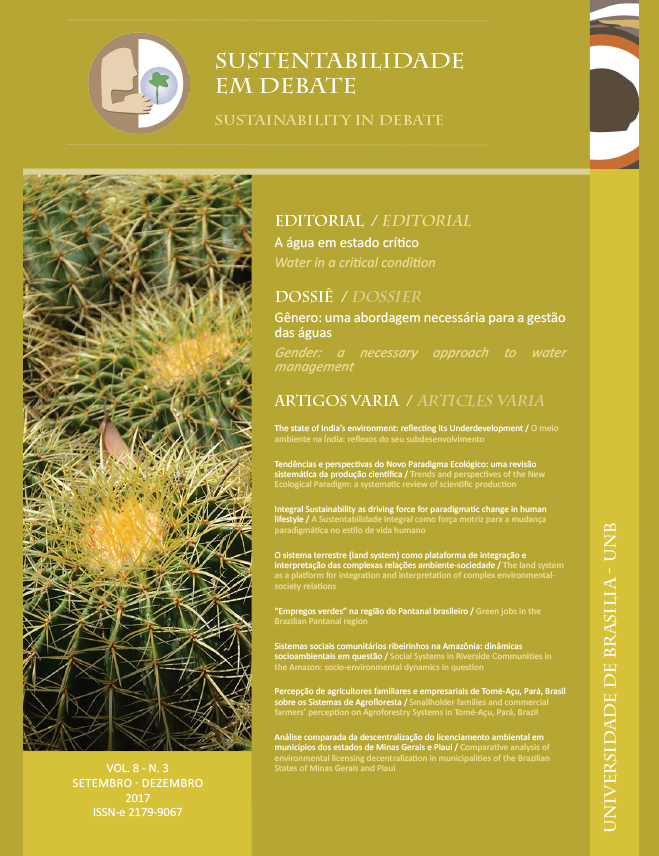Vulnerabilidade e gênero:
uma abordagem para os riscos de desastres no sul do México
DOI :
https://doi.org/10.18472/SustDeb.v8n3.2017.26452Résumé
Neste trabalho apresentamos uma reflexão sobre vulnerabilidade - gênero - risco de desastres e um
estudo de caso no município de San Felipe, costa de Yucatán-México, sobre as percepções de homens
e mulheres quanto à capacidade institucional e da população para enfrentar os riscos de desastres por
furacões, desde uma perspectiva de gênero. Para conhecer as percepções sociais locais, utilizaram-se
os métodos de sondagem e entrevistas com informantes-chave e os resultados encontrados mostram
a existência de graves problemas nas instituições municipais responsáveis pela gestão de riscos de
desastres e pela promoção de processos de maior igualdade de gênero, bem como a necessidade de
fortalecer as capacidades sociais e institucionais na gestão de riscos com equidade de gênero.
Références
BLAIKIE, P., T. Cannon, I. David y B.Wisner (1998), Vulnerabilidad: el entorno social, político y económico de los desastres, La RED, ITDG, Bogotá.
CASTRO, C. (2005), “La inequidad de género en la gestión integral del riesgo de desastre: Un Acercamiento”, Revista de la Universidad Cristóbal Colón 20 (3), Veracruz.
GGCA, UNDP (2009), Exploring the Gen¬der Dimensions on Climate Funds. A Series of Briefs, Global Gender and Climate Allian¬ce, United Nations Development Program¬me, New York.
INEGI (2011), Censo General de Población y Vivienda 2010, Instituto Nacional de Estadística Geografía e Informática, México.
LAVELL, A. (2005). “Desastres y Desarrollo: Hacia un Entendimiento de las Formas de Construcción Social de un Desastre: El Caso del Huracán Mitch en Centroamérica”, en: Fernandez, A. (compilador), Comarcas vulnerables: riesgos y desastres en Centroamérica y el Caribe, Editorial CRIES, Buenos Aires, pp. 11 - 44.
MACÍAS, J. M. (1992), “Significado de la vulnerabilidad social frente a los desastres”, Revista Mexicana de Sociología 54 (4), 3 -10, Instituto de Investigaciones sociales, UNAM, México.
MOLYNEUX, M. y S. Razavi (2005). Beijing Plus Ten: An ambivalent record on gender justice. Revista Development and Change 36 (6), 983-1010.
MUJER Y MEDIO AMBIENTE (2010). Género y cambio climático: en dónde está el debate, Heinrich Böll Stiftung, México.
MUNGUÍA, M. T. y G. Méndez (2011). Caracterización de cuatro municipios de la costa de Yucatán, Informe de Actividades, IMTA, EDUCE, Mérida.
MUNGUÍA GIL, M. T. (2010), Informe: Atlas de vulnerabilidad social frente al cambio climático, EDUCE, Mérida.
ORTIZ, E. y A. Castillo (2008), Plan Local de Manejo de Riesgos, Comunidad de San Felipe, Yucatán, PNUD, Mérida.
PEÑA, H. (2016), Desafíos de la seguridad hídrica en América Latina y el Caribe, Serie Recursos Naturales e Infraestructura, CEPAL, Cooperación Alemana, Santiago de Chile.
PINTO DE ANDRADE, A. J., N. Medeiros da Silva e C. Rozendo de Souza, (2014), As percepções sobre as variações e mudanças climáticas e as estratégias de adaptação dos agricultores familiares do Seridó Potiguar. Desenvolvolvimento e Meio Ambiente, 31, 77-96.
PROGRAMA DE LAS NACIONES UNIDAS PARA EL DESARROLLO (2008), Guía recursos de género para el cambio climático, PNUD, México.
SOARES, D. e I. Gutiérrez (2011), “Vulnerabilidad social, institucionalidad y percepciones sobre el cambio climático: un acercamiento al municipio de San Felipe, Costa de Yucatán”, Ciencia Ergo Sum, 18 (3), Pp. 249-263.
SOARES, D. y D. Murillo Licea (2013), “Gestión de riesgo de desastre, género y cambio climático. Percepciones sociales en Yucatán”, México, Cuadernos de Desarrollo Rural 10 (72), 181-199.
SOARES, D., D. Murillo, R. Romero y G. Millán (2014), “Amenazas y vulnerabilidades: las dos caras de los desastres en Celestún, Yucatán”, Desacatos, núm. 44, pp. 159-177.
WILCHES CHAUX, G. (2000). En el borde del caos, CEJA, Centro Editorial Javieriano, Santafé de Bogotá.
Téléchargements
Publié
Numéro
Rubrique
Licence
SUSTAINABILITY IN DEBATE – Copyright Statement
The submission of original scientific work(s) by the authors, as the copyright holders of the text(s) sent to the journal, under the terms of Law 9.610/98, implies in the concession of copyrights of printed and/or digital publication to the Sustainability in Debate Journal of the article(s) approved for publication purposes, in a single issue of the journal. Furthermore, approved scientific work(s) will be released without any charge, or any kind of copyright reimbursement, through the journal’s website, for reading, printing and/or downloading of the text file, from the date of acceptance for publication purposes. Therefore, the authors, when submitting the article (s) to the journal, and gratuitous assignment of copyrights related to the submitted scientific work, are fully aware that they will not be remunerated for the publication of the article(s) in the journal.
The Sustainability in Debate Journal is licensed under Creative Commons License – Non-Commercial-No-Derivation Attribution (Derivative Work Ban) 3.0 Brazil, aiming at dissemination of scientific knowledge, as indicated on the journal's website, which allows the text to be shared, and be recognized in regards to its authorship and original publication in this journal.
Authors are allowed to sign additional contracts separately, for non-exclusive distribution of the works published in the Sustainability in Debate Journal (for example, in a book chapter), provided that it is expressed the texts were originally published in this journal. Authors are allowed and encouraged to publish and distribute their text online, following publication in Sustainability in Debate (e.g. in institutional repositories or their personal pages). The authors expressly agree to the terms of this Copyright Statement, which will be applied following the submission and publishing by this journal.









